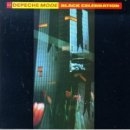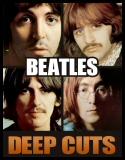Music Home / Entertainment Channel / Bullz-Eye Home
 Buy your copy from Amazon.com Buy your copy from Amazon.com
| Depeche Mode : Black Celebration Released:1986 |
Speak and Spell was the one that put them on the map. Some Great Reward was the one that got them on the charts. Music for the Masses was the one that made them modern rock gods. Violator was the one that made them worldwide superstars, and Songs of Faith and Devotion was the (only) one that hit #1 on the album chart. But get a whole mess of Depeche Mode fans in a room and ask them which is their favorite album by the band, and to a man they will say Black Celebration. It is easily the band’s bleakest album to date, yet it carries a certain affirmation – I’ll drink to that, though it’s not love, it means something, come here, kiss me, now! – that speaks to the awkward teenager in everyone.
The tone is set from the very beginning, with a minor key, “Tubular Bells”-style keyboard creeping in on the title track. Singer Dave Gahan sees a reason to rejoice “the fact that we’ve seen the back / Of another black day.” As the song closes, he tells the listener to, “Take me in your arms, forgetting all you couldn’t do today.” Later, on “A Question of Lust,” Martin Gore pleads, “Be gentle with me / I’d never willingly do you harm.”
The subject of young love dominates the album; song after song contains people who aren’t sure what they’re doing yet but know they want to be held, or kissed, or experience some sort of romantic bond. Curiously, sex doesn’t come into play, not even on “Stripped,” which features the line “Let me see you stripped down to the bone.” It’s really about baring your soul, rather than your naughty bits. The one exception to this is “A Question of Time,” where Gahan tries to protect a 15-year-old girl (perhaps the older sister of the girl in Music for the Masses track “Little 15”) from the horny boys that surround her…or does he? The lyric is rather ambiguous about Gahan’s intentions, especially when he says “Sometimes I don’t blame them for wanting you…I know my kind, what goes on in our minds.” Is he really out to help her, or is he the true predator?
Along with containing the best batch of songs that Martin Gore ever assembled – he wrote catchier songs before and after this album, but never as many consistent ones – Black Celebration features the band’s best instrumentation, and points out just how important Alan Wilder was to the band’s success. (He left the band in 1995 and, in this writer’s humble opinion, Depeche hasn’t been the same since.) From the gas-pumping percussion in “Stripped,” to the disconnected voices and blotchy, speaker jumping bits in “Fly on the Windscreen – Final” (a stupendous improvement of the version that appeared on 1985’s Catching up with Depeche Mode) to the wood-on-wood block beat that propels the paranoid “World Full of Nothing,” the band is simply bursting at the seams with ideas. It also features more vocals from Martin Gore than any other Depeche album. He even sings, shocker, three songs in a row, four if you count his soaring backing vocal on “Fly on the Windscreen.”
The timing of Black Celebration was downright prescient; hot on the heels of the soundtrack for “Pretty in Pink,” which my colleague Will Harris convincingly argues was the birth of the modern rock “scene” (though obviously not modern rock itself), it was Black Celebration that lured adventurous fans of synth pop lightweights like Howard Jones, Go West and Scritti Politti into an altogether different musical universe, one filled with well-read narcissists (Morrissey), makeup-wearing cryptics (Robert Smith, Siouxsie Sioux), and machine-pounding survivors (New Order). For many, nothing was ever the same again, and Black Celebration was the reason for it. I’ll drink to that.
davidm@bullz-eye.com






